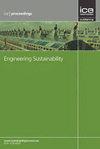Sustainability in geotechnical engineering – what does it mean and why does that matter?
IF 1.5
4区 工程技术
Q3 ENGINEERING, CIVIL
Proceedings of the Institution of Civil Engineers-Engineering Sustainability
Pub Date : 2023-01-03
DOI:10.1680/jensu.22.00076
引用次数: 0
Abstract
The aspiration to act in a more sustainable manner has become a guiding principle across many aspects of life. Yet, sustainability is still often perceived as poorly defined, and there are diverse opinions on what the implications of sustainability for the everyday practice of geotechnical engineers are. On this background, this paper presents a survey conducted at the Norwegian Geotechnical Institute (NGI) in the beginning of 2021 that engaged a group of geotechnical engineers with the fundamental question as to how the concept of sustainability relates to geotechnical engineering. The Q-methodology, a mixed method approach, was applied to analyse different perspectives on sustainability in geotechnical engineering as inferred from the survey results. Three distinct perspectives were revealed that have a focus on (a) striving a balance between human action and nature, (b) mitigating adverse impacts of geotechnical projects, and (c) reducing resource use. Two of the perspectives considered the development of sustainability assessment tools as the most relevant means of working towards sustainable geotechnical practices whilst the third perspective considered multidisciplinary collaboration and research as more important. Reflection on these perspectives can help the development of future tools and strategies, provide a direction for future research, and contribute to a more sustainable geotechnical engineering practice.岩土工程中的可持续性——它意味着什么?为什么重要?
以更可持续的方式行事的愿望已成为生活许多方面的指导原则。然而,可持续性仍然经常被认为是一个定义不明确的概念,关于可持续性对岩土工程师日常实践的影响有不同的观点。在此背景下,本文介绍了2021年初在挪威岩土研究所(NGI)进行的一项调查,该调查让一组岩土工程师参与了关于可持续性概念如何与岩土工程相关的基本问题。q -方法论是一种混合方法,应用于分析从调查结果推断的岩土工程可持续性的不同观点。揭示了三个不同的观点,重点是(a)努力在人类活动与自然之间取得平衡,(b)减轻岩土工程的不利影响,以及(c)减少资源使用。其中两个观点认为发展可持续性评估工具是实现可持续岩土工程实践的最相关手段,而第三个观点认为多学科合作和研究更为重要。对这些观点的反思有助于未来工具和策略的发展,为未来的研究提供方向,并有助于更可持续的岩土工程实践。
本文章由计算机程序翻译,如有差异,请以英文原文为准。
求助全文
约1分钟内获得全文
求助全文
来源期刊

Proceedings of the Institution of Civil Engineers-Engineering Sustainability
ENGINEERING, CIVIL-ENGINEERING, CIVIL
CiteScore
3.70
自引率
16.70%
发文量
44
审稿时长
>12 weeks
期刊介绍:
Engineering Sustainability provides a forum for sharing the latest thinking from research and practice, and increasingly is presenting the ''how to'' of engineering a resilient future. The journal features refereed papers and shorter articles relating to the pursuit and implementation of sustainability principles through engineering planning, design and application. The tensions between and integration of social, economic and environmental considerations within such schemes are of particular relevance. Methodologies for assessing sustainability, policy issues, education and corporate responsibility will also be included. The aims will be met primarily by providing papers and briefing notes (including case histories and best practice guidance) of use to decision-makers, practitioners, researchers and students.
 求助内容:
求助内容: 应助结果提醒方式:
应助结果提醒方式:


